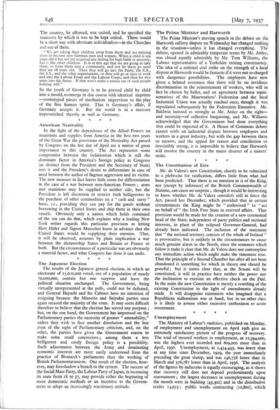The Constitution of Eire Mr. de Valera's new Constitution, shortly
to be submitted to a plebiscite for ratification, differs little from what had been predicted. That there is no mention in it of the King, nor (except by inference) of the British Commonwealth of Nations, can cause no surprise ; though it would be interesting to know whether Mr. de Valera considers still in force the Act, passed last December, which provided that in certain circumstances the King might be " authorised " to "act on behalf of" the Irish Free State in external affairs. That provision would be made for the creation of a new ceremonial head of the State, independent of party politics and sectional interests, in place of the eclipsed Governor-General, had already been indicated. The inclusion of the statement that "the national territory consists of the whole of Ireland" is provocative, but is unlikely in the circumstances to cause much genuine alarm in the North, since the sentences which follow it make it clear that Mr. de Valera does not contemplate any immediate action which might make the statement true. That the principle of a Second Chamber has after all not been abandoned is something for which in theory one should be grateful; but it seems clear that, as the Senate will be constituted, it will in practice have neither the power nor the inclination to exercise an effective check on the Dail. In the main the new Constitution is merely a rewriting of the existing Constitution in the light of amendments already made. It will disappoint extremists who imagined that a Republican millennium was at hand, but in no other class is it likely to arouse either excessive enthusiasm or acute resentment.














































 Previous page
Previous page